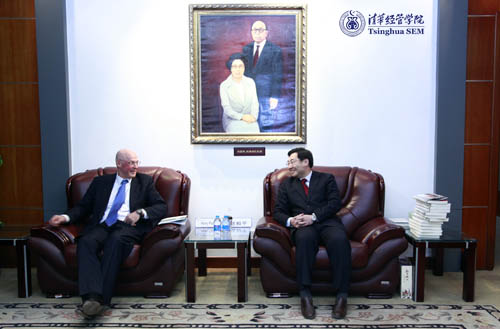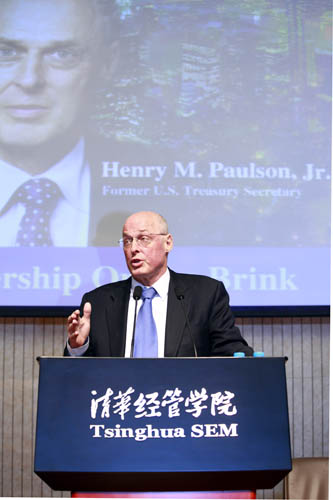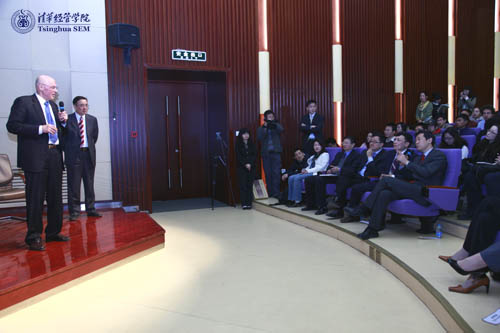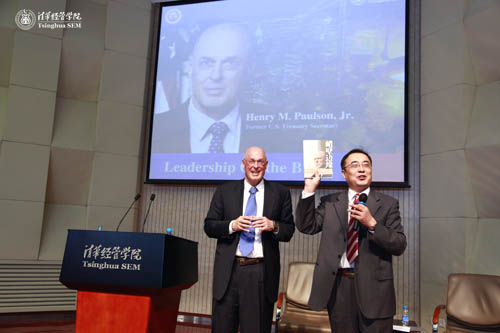Henry M. Paulson, Jr., Former United States Treasury Secretary, an Honorary Member of Tsinghua SEM’s Advisory Board, delivered a speech named “Leadership on the Brink” at Tsinghua SEM on April 7, 2010.
Back to Tsinghua
Before the speech, Paulson met with Tsinghua University’s Council Chairman HU Heping and Vice President XIE Weihe. HU Heping extended welcome to Paulson on behalf of the University. He said the Advisory Board of Tsinghua SEM has been making significant contributions to Tsinghua University as a whole, and he would like to thank Paulson for his efforts along the development of the Board. Paulson said he was glad to visit Tsinghua for the second time. As an Honorary Member of the Advisory Board, he expected to see further cooperation with the University.

Council Chairman HU Heping (right) and Henry M. Paulson, Jr. (left)
Leadership on the Brink
The speech took place in the Auditorium of Weilun Building. Vice President XIE Weihe of the University opened the speech by reviewing the friendship between Paulson and Tsinghua University, especially Tsinghua SEM. He recalled the first meeting Paulson had with Tsinghua students in September 2006.
Paulson first reviewed his personal work after leaving the post as Treasury Secretary. He said he was glad to see his memoirOn the Brinktranslated into Chinese. He has also been planning to continue contributing to clean energy, conservation and other environmental issues around the world, including in China.

Paulson delivering the speech
Paulson congratulated the achievements of Chinese economy after the Reform and Opening-up. China had been the engine for global economy in the crisis, he said, and every Chinese should be proud.
Paulson said he believed that China and America enjoy mutual economic benefits. There are always tensions and differences, but the strategic relationship has been coming closer, for both parts have essential benefits in stable global growth, global trade, international investment, anti-terrorism, prevention of nuclear proliferation, environmental protection, energy efficiency and other issues.
Paulson also explained his understanding of the economic crisis and expressed confidence for the future. He said the crisis is not the fault of the market, which has been putting capital behind ideas, creating jobs, promoting prosperity and improving lives through past twenty years globally, especially in China. What are responsible for the crisis, according to him, should be the mistakes made by policy makers, bankers, non-financial institutions, investors and regulators. As he emphasized, the outdated regulatory system is neither comprehensive enough to cover non-bank financial institutions, nor flexible enough to deal with the ever-changing market situations. However, he also said, what is good about America is that any problem emerged would be quickly put under attention and a reform would be carried out. Currently, the process is underway and the economy of America has gone back toward the right direction, about which Paulson said he was optimistic.

Paulson used the last section of his speech to give career advices about how to build a strong leadership. He said being smart and diligent does not guarantee effective leadership. There are five indispensable elements for a successful leader: having a life-long passion for learning; defining one’s job expansively and embracing challenges; being able to working with and caring for others; upholding integrity; and promoting public good. What’s more, he also stressed the importance of a well-kept balance between one’s job and personal life.
After the speech, Paulson answered questions from students. Topics discussed include the social understanding of bankers, a review of communication inefficiencies in the crisis, RMB exchange rate as well as the life-goal and career balance.

Vice President XIE Weihe inroducing Paulson's memoir
Tsinghua Global Vision Lectures
The speech is part of Tsinghua Global Vision Lectures,an initiative launched by Tsinghua University in its effort to educate students with global perspectives. It consists of a series of lectures given by political leaders, Nobel Laureates, world’s leading entrepreneurs, university presidents, and outstanding experts in a wide range of fields.
The lecture series constitute a university-level open course which is available to all students in Tsinghua University. Students can register online and they can apply for credit when they take a certain number of lectures.
An Introduction: Henry M. Paulson, Jr.
Henry M. Paulson, Jr. graduated from Dartmouth in 1968, where he majored in English. He served under President George W. Bush as the 74th Secretary of the Treasury from June 2006 until January 2009. Before going to the Treasury Department, Paulson had a thirty-two year career at Goldman Sachs serving as Chairman and Chief Executive Officer since the firm’s initial public offering in 1999. He is also involved in a range of conservation and environmental initiatives, having served as Chairman of The Peregrine Fund, Inc., Chairman of the Board of Directors for The Nature Conservancy and was Co-Chairman of its Asia/Pacific Council.
Paulson was the first Chairman of Tsinghua SEM’s Advisory Board. During his three-year tenure, he invited internationally famous entrepreneurs and scholars to join the Board, and kept close contact with all members. The Tsinghua-Harvard Executive Education Program and the China Center for Financial Research were both initiated with his support. Currently, Paulson is an Honorary Member of the Advisory Board.
 Latest News
Latest News